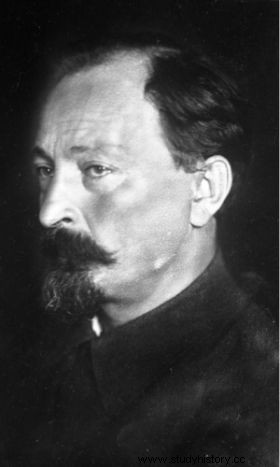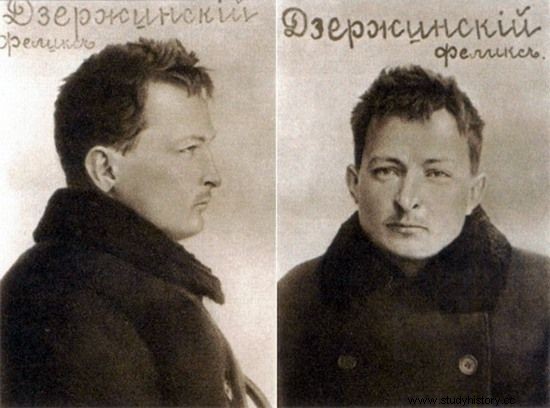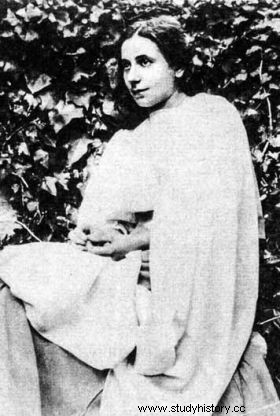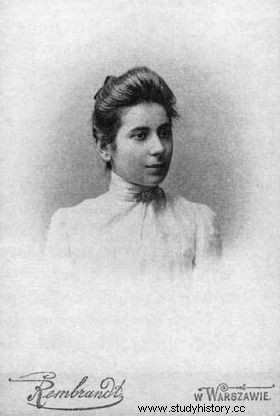a href ="http://ciekawostkihistoryczne.pl/wp-content/uploads/2014/01/mlody-dzierzynski-1.jpg"> Żigolak's beauty, unimaginable courage, fanaticism, dangerous life - these are the features that always attracted women. So Feliks Dzerzhinsky could not complain about the lack of success with the opposite sex. Before he became the "Eternal Flame of Revolution" and the "red executioner" he was ... the greatest Casanova among the communists
It is the very beginning of the 20th century. Nobody is thinking about the world war yet, the October Revolution will take place in a decade. Communists are still a fresh, radical movement, gaining popularity mainly in large Russian cities. Young Feliks Dzerzhinsky works in such conditions.
Chased by the Tsarist Guard and shifted from place to place by the illegal Social Democracy of the Kingdom of Poland and Lithuania, he appears in every city for a moment, out of nowhere and ... he is always looking for a moment of oblivion in the arms of a local mistress. Of course, he has to keep women interested until the next visit, which he does by writing passionate and passionate letters.
Party deliberations, but Felix only thinks of girls
Our professional revolutionist writes to Sabina Feinstein, who comes from a good Warsaw home, beautiful and assimilated Jew, almost like a Young Polish poet:

Dzerzhinsky at the peak of his political career. It's hard to believe that this grandfather and the pugnacious boy in the photo above are the same person! (Photo from Bundesarchiv, license CC-BY-SA 3.0).
I am insane and I am afraid to write (...) I feel that I have to commit madness, that I must still love and talk about it (...). But I love - I love strongly, infinitely (...). My soul saves itself and finds its way out in these mystical outbursts and moods, in these sad feelings as for a beloved, dearest child - for you ( quoted after: S. Frolow, Dzerzhinsky. Love and revolution , Znak Horyzont, 2014).
No woman can remain indifferent to such confessions. During each stay in Warsaw, Feliks can count on the favor of this attractive, though slightly older woman. No wonder that the still young, 28-year-old man allows himself to be carried away by fatal passions and drives of the body, which he expresses in his private notes:
And here I am thinking about seeing it today. At a serious meeting, I think about it. Scandal. I'm crazy.
Yes, a scandal - during the several-hour long party debates, Iron Felix, instead of the revolution, thinks about the moments of pleasure in his lover's arms that await him in the evening ...
A love triangle with two sisters
It was unfortunate that Sabina's sister Michalina (called Mica by her relatives) also fell in love with the foretold and more and more famous revolutionist.
Sabina wants to "give up" Feliks to her younger sister, tries to convince her lover to marry Mica, who was more meritorious in a revolutionary job. The latter, however, does not want to hear about it at all. True, he is flattered by Michalina's interest, but of the two sisters, he finds Sabina much more attractive, both physically and intellectually.

Feliks in the photo of Ochrana from 1902. He's put on a bit of weight, but still handsome! (Wikimedia Commons, public domain).
The story of the love triangle ends tragically. In October 1909, Michalina commits suicide in Berlin - poisoning herself with potassium cyanide. He leaves his sister - a rival for Felix's favor, with a dramatic letter:

Don't get tired. Live calmly, because I don't want the thought of me to poison me (...). This is my request, a great request. Make him happy, be her alone. Goodbye kissing (quoted after:S. Frołow, Dzerzhinsky. Love and revolution . Horizon sign, 2014).
Party comrades try to cover up the whole matter quickly, simulating death from natural causes - a scandal and police interest could harm the cause of the revolution. But the social democratic world is boiling with indignation. Dzerzhinsky's party companion, Jakub Hanecki, who has a secret crush on Sabin, tries to take advantage of the situation. He blames the desperate woman for the death of her sister, argues that in this situation she should part with Felix, and preferably ... marry him!
Meanwhile, Feliks, sentenced to hard labor, is on his way to Siberia. However, he manages to escape from exile (for the third time!) And come to Warsaw, where he tries to calm Sabina: You did not hurt her - he writes that our happiness is her desire!
This article has more than one page. Please select another one below to continue reading.Attention! You are not on the first page of the article. If you want to read from the beginning click here.

Sabina Feinstein. Felix's great passion… She loved him for the rest of her life. He quickly found another one.
Sam doesn't feel any remorse - I think he even enjoys the development of the situation, because no one is standing in the way of his relationship with Sabina anymore. They go to Berlin together, Feliks proposes marriage, but the one in his heart cannot cope with the grief for his sister.
- Yes, I have a wife and a child. - Then I will marry someone else too!
Discouraged, Dzerzhinsky, now sent to Krakow by his party comrades, is linked with another woman - Zofia Muskat. They meet for several months, Zofia becomes pregnant. The emotional breakthrough comes during a two-week holiday spent together in the Tatra Mountains. Felix decides to get married - first in a party, then (surprisingly!) also in Catholic - in the St. Nicholas Church in Krakow at Kopernika Street.
Desperate Sabina writes a dramatic letter to Feliks : I was told that you got married. I am waiting for an answer:is it true. The man who promised her to live together does not even try to explain himself, he attacks himself and blames Sabina for the breakdown of the relationship. But actually his heart is torn apart. For some reason, he has a rather peculiar idea that he will write about his emotional dilemmas ... to his wife Zofia, who has just been arrested (in advanced pregnancy) and imprisoned in Warsaw (they will see each other only after eight years!):
I wrote to her about everything - the whole truth - this double truth - without concealing anything or hiding anything. She found out, and then she understood everything. And after a terrible fight - she forgave me (quoted after:S. Frołow, Dzerzhinsky. Love and revolution . Horizon sign, 2014).
But Sabina doesn't forgive at all. On the contrary. He gets an attack of rage - looking for revenge, he wonders how he can hurt his former lover the most: Why wouldn't I actually become Kuba [Hanecki's] wife?
Feliks, oblivious to his own betrayal, makes a scene of wild jealousy: Ah, yes! So you can be someone's wife without love - without loving? Apparently you can (…). I hate you - you hear - I hate you, as I once loved immensely (...). This lady, and no one else, taught me to look for "happiness" in someone else's arms.

Michalina Feinstein. She committed suicide, unable to accept the thought that Felix would never love her.
And although the heat between Sabina and Felix will return in their letters for a while, after a year - this is the end. Why did Dzerzhinsky choose Sophia and not Sabina, the woman who was passionate about his life? As his son Jan recalled years later: when Feliks had to choose between Zofia and Sabina, he chose the one that guaranteed a partnership in revolutionary work, without emotions that were disastrous for both of them.
Sabina Feinstein will live to be 89 years old, never having a relationship with any other man. She makes herself bury with Felix's mother's ring, which he once gave her.
Source:
The article is based on the book by Sylwia Frołow entitled Dzerzhinsky. Love and revolution (Horizon Mark, 2014).
